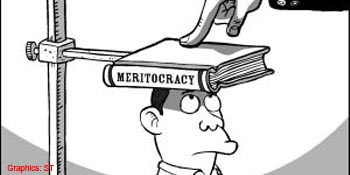By: Park MacDougald
If you use social media, you have probably been exposed in recent days to a sometimes funny, more often depressing deluge of hysterical reactions to the reelection of one Barack Hussein Obama. If your newsfeed did not provide you with sufficient all-caps cries of socialism, obliviousness to spell-check, or thinly veiled racism, a website, White People Mourning Romney, has sprung up to catalog some of the more hyperbolic reactions in the form of photos, texts, and screen captures from Facebook and Twitter. One Facebook user, whose name is withheld, writes:
“I’m no longer proud to be an American… I’m living in a country who values image over substance, sloth over hard work, and socialism over capitalism.” He goes onto call Obama voters “scum-sucking leaches [sic] and parasites, which [sic] now outnumber people like me who still value Liberty, Freedom, and an honest day’s work.”
Twitter user Mike Russo (@mikerusso) opines: “i hate america the electoral college and welfare,” while occasional rock guitarist and full-time lunatic Ted Nugent offers this sage diagnostic: “Pimps whores & welfare brats & their soulless supporters hav a president to destroy America.”
That people should be upset after losing what has been a particularly bitter election is not news. People will say stupid and inflammatory things when they are upset, and the Left is no less guilty of this than the Right. It is also natural that our attention should be drawn to the most outlandish statements at the expense of more reasoned responses that are no doubt more representative of the average Romney voter than angry teenagers on the internet or a loincloth-wearing musician. However, the sheer preponderance of these types of responses, whether from acquaintances on Facebook or from conservative media figures like Bill O’Reilly and Rush Limbaugh, suggests that the idea of Obama voters as unproductive “takers” living off of government largesse has a deep resonance within the conservative movement. While some Republican leaders were quick to acknowledge the missteps of Romney, the effectiveness of the Obama campaign, and the failure of the Republican Party to adapt to shifting demographics, it seems that for many the election was only a confirmation that America had descended into a Randian dystopia, in which a teeming mass of “moochers” and “second-handers” live off the stolen wealth of the productive classes. According to this narrative, the Republicans had not been wrong, they had merely underestimated the indolence and moral depravity of the electorate. What can a good party do, if people won’t take responsibility for their lives?
The French utopian Henri de Saint-Simon conceived of a meritocratic society in which each man would be placed according to his capacity and rewarded according to his work. This concept of the equality of opportunity, as opposed to the equality of material well being, (or “equality of result”) is deeply embedded into the American collective consciousness. The American Dream, as traditionally conceived, tells us that no one is going to take care of us, but that if we work hard, try our best, and follow the rules, we will be given the opportunity to succeed, no matter our gender, creed, color, or national origin. For hundreds of years, the dynamism of American society has provided a foil to the rigid class structures of Europe, and lured immigrants from around the world with the promise of upward social mobility – better lives for their children than the ones they had led themselves. Implicit in this formulation is that success or failure is largely, if not entirely dependent on the efforts of the individual. Just as success is the reward of hard work, failure is the punishment of the lazy, the foolish, and the irresponsible. In some sense, poverty is a moral failing, one that should not be “incentivized” by handouts from the “nanny-state.”
Whether or not this system is “right” in a moral sense (see this interview with Chris Hayes for an intelligent argument as to why it is not), it pre-supposes the existence of a meritocracy that bears little relation to the current reality. While Americans, far more than Europeans, continue to believe in the possibility of inter-generational income mobility, multiple studies have suggested that that Americans are less likely than their European counterparts to move up the socio-economic ladder over the course of their lifetime. A 2006 study by the Center for American Progress (linked above) found that “the United States has an unusually low level of intergenerational mobility: our parents’ income is highly predictive of our income as adults.” It went on to state: “Intergenerational mobility in the United States is lower than in France, Germany, Sweden, Canada, Finland, Norway, and Denmark.” Crucially, it also suggested that “people who work long hours on a consistent basis no longer appear to be able to generate much upward mobility for their families.” A more recent, separate study conducted by the Pew Center’s Economic Mobility Project found that “42% of American sons of fathers born in the poorest [income] quintile landed in the poorest quintile themselves,” compared with 30% for the United Kingdom and around 26% in the Nordic countries. Though this does not establish causality, it would seem to undermine the thesis that extensive social services promote complacency.
Education makes a significant difference, but this too is heavily determined by socioeconomic status – parents’ income is a more important determinant than academic attainment. In addition, the price of higher education (and the decreasing willingness of state governments to fund it) means that it is increasingly out of reach for the poorest Americans. Gone are the days when one could easily reach the middle class without a college education. The employees of Wal-Mart (America’s largest employer) receive such low wages that those with children are eligible for welfare, and other research suggests that, even for most college graduates, wages have been stagnant or declining for the past decade. While the statistics are not all pessimistic – 84% of Americans still have higher family incomes than their parents did – they certainly suggest that we are headed in the wrong direction.
The studies that I have cited above paint a relatively bleak picture. Explanations as to why this is the case will differ. It is the right and indeed the responsibility of the Republican Party to criticize the Obama administration and to offer alternative solutions to the problems we face as a nation. A two-party system cannot function without a legitimate opposition. Mitt Romney and the Republican Party offered an alternate path for the country, one that resonated with almost half of the electorate, but that was ultimately rejected. What the Republican Party cannot do, however, is write off the 61.5 million Americans who voted for President Obama as moochers who want free stuff. Individual initiative is important, that much is clear. However it should be obvious when discussing these issues that it is not simply a case of lazy “takers” assaulting the makers. A “culture of victimhood” should not be encouraged, but neither should we assault the very real victims of an imperfect system. Acknowledging the serious structural problems that affect our society is neither socialism nor playing “Santa Claus” – it is responsible and necessary, and both parties must acknowledge these problems if we are ever to make progress.

